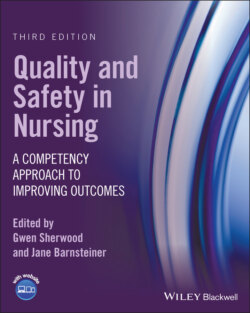Читать книгу Quality and Safety in Nursing - Группа авторов - Страница 30
Workforce: Impact of the Work Environment
ОглавлениеHealth care workers are affected by the quality of care in the systems in which they work, experiencing loss of morale and lower satisfaction when they are not able to provide best care. Health care is value based; professionals pledge, first, to do no harm. Quality is an essential value. Professionals take pride in doing the right thing, but quality is more than will; it is a mindset of inquiry and the capacity to use appropriate tools to improve the systems in which we work. QI intersects all areas of health care, from economic issues to the moral basis undergirding quality for doing our best. It builds on health professionals’ shared values, moral commitment, and mindful presence to do work well (Dempsey and Assi, 2018). Health professionals have the motivation and ability to improve systems if they have the necessary education and training and work in organizations where they are supported (Janes et al., 2021).
Brooks Carthon et al. (2019) examined the role of the work environment on patient safety. The influence of human factors, the interrelationship between people, technology, and the environment in which they work, affects how they complete their work. Human factors consider the ability or inability to perform exacting tasks while attending to multiple tasks at once. The attention from organizational leaders to human factors includes managing workload fluctuations, seeking strategies to minimize interruptions in work, and attending to communication and care coordination across disciplines (Roussel, 2019). Nurses manage care coordination, employ checklists, and ensure safe handoffs between providers and settings (Bowles et al., 2019). Nurses are challenged with multitasking, distractions, fatigue, task fixation that limits environmental scanning, and hierarchy and authority gradients, staffing, and interpersonal relationships, all of which contribute to fatigue and emotional exhaustion, which challenge the ability to provide good care (Tawfik et al., 2019).
Psychological safety is critical for organizational learning. New graduate nurses in particular need to feel psychologically safe as they transition into professional nursing practice. Understanding new graduate registered nurses’ experiences of psychological safety can guide leaders and others to create work environments that foster psychological safety and organizational learning (Zhao, Ahmed, and Faraz, 2020). Psychological safety is an emerging area of study in patient safety that has been particularly evident in the 2020–21 COVID‐19 pandemic, as so much of health care shifted priorities leaving many feeling vulnerable. The pandemic reinforced the connection of psychological safety to inclusive leadership and healthy worker relationships. Team members who feel psychologically safe are comfortable sharing innovative ideas, providing feedback and speaking up about problems—without fear of repercussions.
